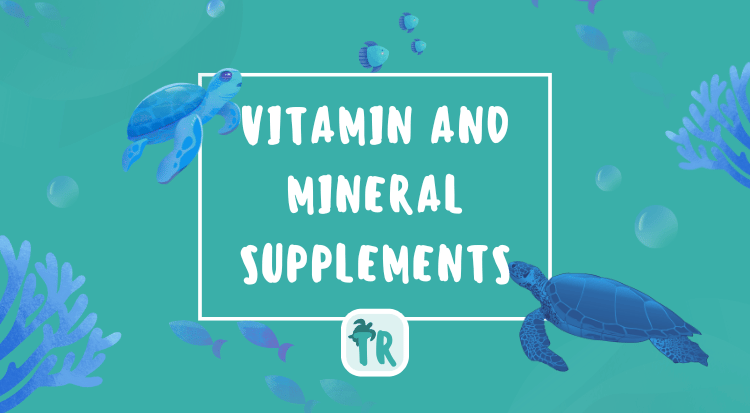Vitamin and Mineral Supplements for Turtles
Discover the importance of vitamin and mineral supplements for turtles. Learn how to choose and use them safely to keep your pet healthy.

Vitamin and mineral supplements are not just additional elements in your pet turtle's diet; they are the key to unlocking their full health potential. You are taking a proactive step in their well-being by ensuring your turtle gets all the necessary nutrients that their regular diet might not fully provide.
This guide will empower you to know why turtle supplements are important, the types of supplements available, how to use them safely, and tips for choosing the right ones. By understanding how to properly supplement your turtle's diet, you can take charge of its health and help it lead a long and healthy life.
Why Supplements Are Important
Even with a balanced diet, turtles may still lack certain nutrients.
Nutritional Gaps
- Diet Limitations: Captive diets may not fully replicate what turtles eat in the wild.
- Essential Nutrients: Vitamins and minerals are vital for growth, shell strength, and overall health.
Health Benefits
- Strong Shell and Bones: Calcium and vitamin D3 support shell and bone development.
- Immune System Support: Vitamins like A and E boost immunity.
- Preventing Deficiencies: Avoid issues like metabolic bone disease and eye problems.
Types of Supplements
There are several types of supplements suitable for turtles.
Calcium Supplements
Calcium Powder
- Use: Sprinkle on food to boost calcium intake.
- Frequency: Typically used every other feeding.
Cuttlebone
- Description: A hard, chalky bone from cuttlefish.
- Benefits:
- Chewing Aid: Helps wear down beaks.
- Calcium Source: Turtles can nibble as needed.
- Placement: Float in the tank or place in the enclosure.
Vitamin D3 Supplements
- Importance: Helps turtles absorb calcium.
- Sources:
- UVB Lighting: Essential for vitamin D3 synthesis.
- Supplement Powder: Some calcium powders include vitamin D3.
- Note: Do not rely solely on supplements; UVB light is crucial.
Multivitamin Supplements
- Content: Provide a mix of essential vitamins and minerals.
- Use: Sprinkle on food once or twice a week.
- Benefits:
- Vitamin A: Supports eye and skin health.
- Vitamin E: Aids in reproductive and immune health.
Liquid Supplements
- Application: Added to water or directly to food.
- Considerations:
- Dosage Accuracy: Follow instructions carefully.
- Absorption: It may be less effective than powders.
How to Use Supplements Safely
Proper usage ensures your turtle gets the benefits without risks.
Dosage Guidelines
- Read Labels: Follow the manufacturer's instructions.
- Avoid Over-Supplementing: Too much can be harmful.
- Consult a Vet: For personalized dosage recommendations.
Application Methods
- Dusting Food:
- Method: Lightly coat fresh foods or pellets with powder.
- Tips: Use a small bag or container to shake and coat food evenly.
- Providing Cuttlebone:
- Preparation: Remove the hard backing before offering.
- Placement: Secure in the habitat where your turtle can access it.
Monitoring Your Turtle
- Watch for Changes: Note any changes in behavior or health.
- Adjust as Needed: Modify supplement usage based on your turtle's response.
Choosing the Right Supplements
Selecting quality products is essential.
Quality Brands
- Reputable Manufacturers: Choose trusted brands known for safety.
- Reviews and Recommendations: Look for products endorsed by veterinarians or experienced turtle owners.
Species-Specific Needs
- Research: Different species may have unique requirements.
- Custom Formulas: Some supplements are designed for specific types of turtles.
Expiration Dates
- Check Dates: Ensure the product is not expired.
- Storage: Keep supplements in a cool, dry place.
Common Mistakes to Avoid
Being aware of common errors helps prevent health issues.
Over-Supplementation
- Risks: This can lead to toxicity and health problems.
- Solution: Stick to recommended dosages.
Ignoring UVB Lighting
- Mistake: Relying solely on vitamin D3 supplements.
- Solution: Provide proper UVB lighting to aid natural vitamin D3 production.
Inconsistent Use
- Issue: Irregular supplementation may not meet nutritional needs.
- Solution: Establish a regular supplementation schedule.
Consulting a Veterinarian
Professional guidance ensures your turtle's specific needs are met.
- Health Assessments: Regular check-ups can identify deficiencies.
- Personalized Advice: Vets can recommend the right supplements and dosages.
- Addressing Issues: Seek help if you notice vitamin deficiency or overdose signs.
Conclusion
When used correctly, vitamin and mineral supplements are a valuable addition to your turtle's diet. They help fill nutritional gaps and support overall health. By choosing the right supplements, using them safely, and monitoring your turtle's well-being, you can contribute significantly to their quality of life. Remember, a combination of a balanced diet, proper lighting, and appropriate supplementation is key to keeping your turtle healthy and happy.
